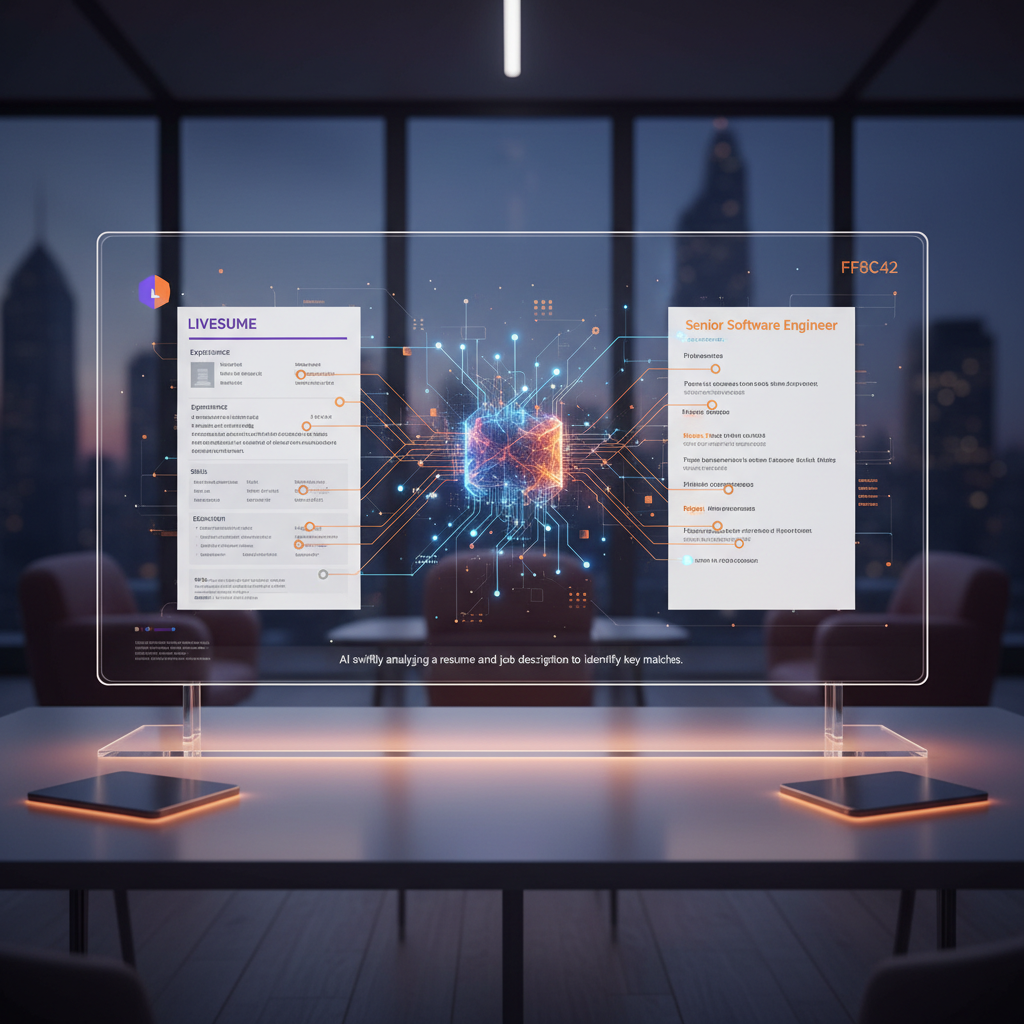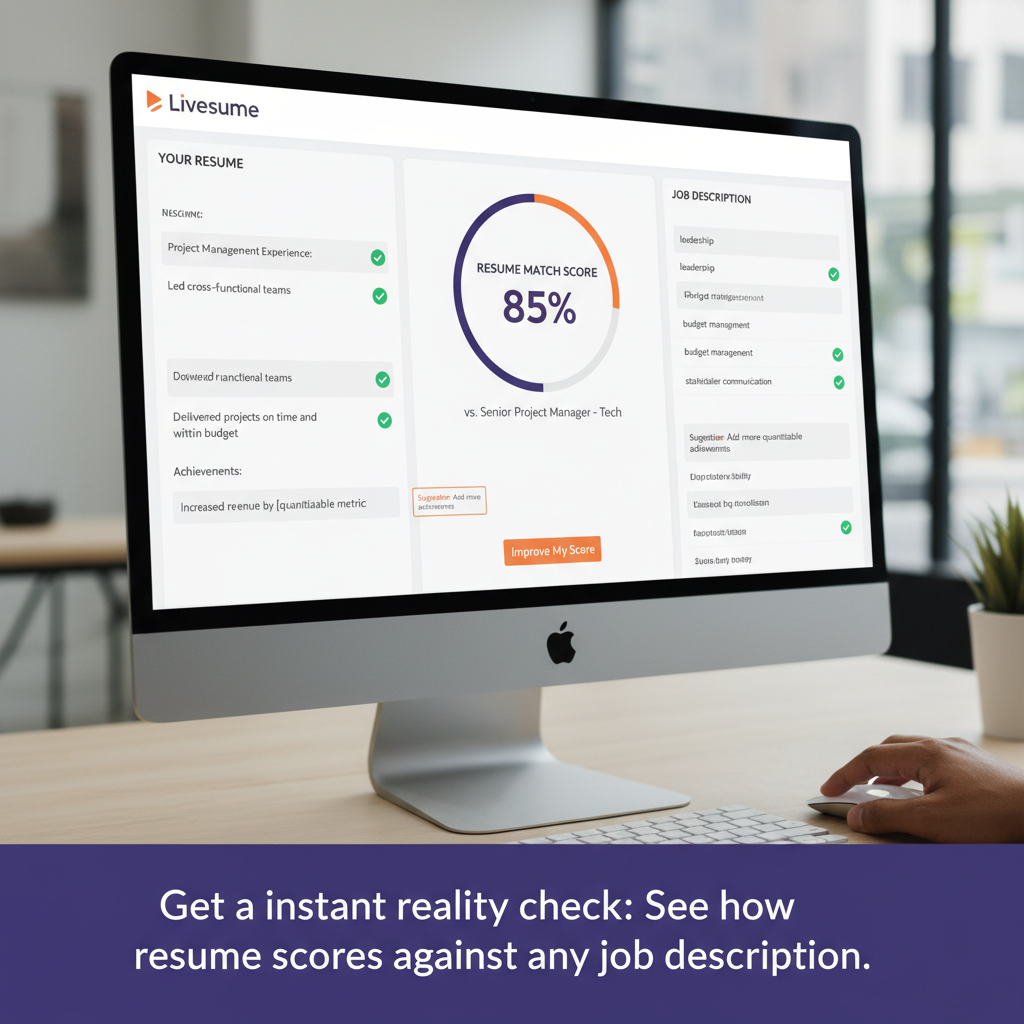You’ve spent hours polishing your resume, hit "apply," and then... silence. It feels like your application vanished into a digital black hole. You're not just imagining it. A staggering 36% of resumes are rejected simply for being too generic. It’s a frustrating cycle, but what if you could tailor a perfect, interview-winning resume for any job in minutes? That's not a fantasy; it's exactly what AI can do for you right now.
Key Takeaways: Your AI Advantage
- Beat the Bots, Charm the Human: AI helps you strategically embed the right keywords to sail past Applicant Tracking Systems (ATS), while also framing your skills in a way that impresses human recruiters.
- Personalize at Scale: Stop the painstaking process of rewriting your resume for every single application. AI tools let you create a perfectly tailored version in a fraction of the time.
- Translate Duties into Impact: AI acts as your personal career coach, transforming bland job duties into compelling, metric-driven accomplishments that scream "high-performer."
- Get an Instant Reality Check: No more guessing games. AI scanners score your resume against the job description, showing you exactly what to fix to increase your chances of getting a callback.

Why Your "Good Enough" Resume Gets Ignored
Here’s the hard truth: your resume has two gatekeepers to pass. First, the Applicant Tracking System (ATS), a piece of software that scans for keywords and qualifications. If you don't use the exact phrasing from the job description, you're out before a human even knows you exist. According to recent data, 75% of resumes are never seen by human eyes because they fail this initial screening.
If you make it past the bot, you then have about seven seconds to impress a real person. That’s it. Recruiters are swamped, and they scan for immediate proof of value. A generic resume listing duties just doesn't cut it. They need to see results, impact, and a direct solution to their company's problem. This is where AI changes everything.
The AI-Powered Resume Audit: A 3-Step Framework
Don't just write your resume; stress-test it. This framework uses AI to ensure your resume is not just good, but optimized for the specific job you want.
Step 1: Deconstruct the Job Description
Before you write a single word, you need to know what the company is *really* asking for. Copy the entire job description and paste it into an AI tool like Claude or ChatGPT.
Use this prompt: "Analyze this job description. Identify the top 5 hard skills, 5 soft skills, and key action verbs. Extract any phrases related to company culture or specific business goals."
The AI will hand you a cheat sheet of the exact keywords and themes the ATS and hiring manager are looking for. This is your foundation.
Step 2: Map and Magnify Your Experience
Now, look at your experience through the lens of that AI-generated cheat sheet. For each role, ask an AI tool to help you rephrase your accomplishments. This is where you go from generic to memorable.
Micro Transformation Example:
- Before: "Managed the company's marketing campaigns."
- After (with AI help): "Drove a 25% increase in lead generation by executing multi-channel marketing campaigns focused on SEO and targeted content syndication."
Tools like the Livesume resume builder have this AI functionality built right in. You can feed it a bland statement, and it will suggest several high-impact, metric-focused alternatives tailored to the keywords you identified in Step 1.

Step 3: Score and Refine
Once your draft is ready, it’s time for the final check. Use an AI-powered resume scanner (like Jobscan or the integrated tools in many modern resume builders) to upload your resume and the original job description. It will give you a match score, typically out of 100, and highlight missing keywords, unclear phrasing, and other areas for improvement. Aim for a score of 80% or higher before you even think about applying. This data-driven approach removes the guesswork completely.
Stop Guessing. Start Getting Interviews.
Ready to see how your resume stacks up? Use Livesume's AI-powered resume builder to instantly score your resume against any job, get tailored suggestions, and build a document that truly works for you.
Picking Your AI Co-pilot: A Quick Comparison
Not all AI tools are created equal. Here’s a quick rundown:
- For Deep Analysis (Free): ChatGPT or Claude are fantastic for deconstructing job descriptions and brainstorming powerful bullet points. You'll have to do the copy-pasting yourself, but the insights are top-tier.
- For Integrated Building & Scoring: Platforms like Livesume or Teal integrate everything into one workflow. They connect your master resume to a job tracker and let you generate tailored versions and score them on the fly. This is the most efficient option.
- For Quick Rewrites: Tools like Kickresume are great for quickly generating content and rephrasing existing bullet points, though they might offer less in-depth scoring against specific job descriptions.
The best tool is the one that fits your workflow. The key is to move from a static document to a dynamic live resume that you can adapt quickly and confidently.
Frequently Asked Questions (FAQ)
Will recruiters know I used AI on my resume?
No, not if you use it correctly. The goal of AI is to help you articulate your own experience more effectively. Use it as a co-pilot to refine your thoughts, not to invent them. Always review the AI's suggestions to ensure they sound like you and accurately reflect your work.
Is AI helpful for career changers?
It's a huge advantage. AI can help you identify transferable skills from your past roles and reframe them using the language of your new target industry. It's excellent at translating experience from one field to another.
Can AI help me write a cover letter too?
Absolutely. You can use the same principles: feed the AI your resume and the job description, and ask it to generate a draft cover letter that connects your specific achievements to the company's needs. It’s a fantastic way to beat writer's block.
What's the biggest mistake people make with AI resume builders?
Accepting the first suggestion without editing. AI generates content based on patterns; it doesn't know the specific context of your achievements. Always treat AI suggestions as a starting point and add specific details, metrics, and your own voice to make them authentic.
How do I keep my resume from sounding robotic?
Read it out loud. If it sounds clunky or full of buzzwords, it probably is. Use the AI to generate ideas, then simplify and refine the language until it sounds natural and confident. A good resume is clear and direct.
Are free AI resume tools any good?
Many free tools are excellent for basic tasks like keyword extraction and bullet point brainstorming. However, paid platforms often provide more valuable, integrated features like unlimited resume scoring, design templates, and the ability to manage multiple versions of your resume and digital portfolio.
Turn Your Resume From a Document Into a Conversation Starter
Your resume isn't just a piece of paper; it’s your opening argument in a negotiation for your next job. A generic document gets you ignored. A sharp, tailored, AI-powered resume proves you’re the right person for the role before you even speak to anyone.
Here’s your next step: don't just close this tab. Pick one job you're excited about. Run your current resume and that job description through an AI tool. See your score. You’ll know within minutes exactly what you need to do to go from being overlooked to getting shortlisted.